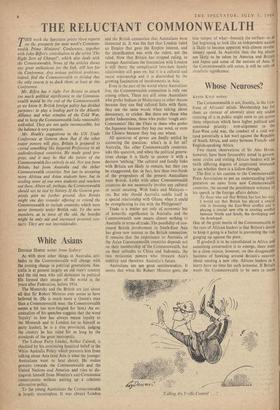White Asians
DONALD Holm writes from Sydney: As with most other things in Australia, atti- tudes to the Commonwealth will change with the coming change in political generations. Aus- tralia is at present largely an old man's country and the old men who still dominate its political Ilife formed their images of the world in the years after Federation, before 1914.
The Monarchy and the British are just about all that Sir Robert Menzies ever seems to have believed in. (He is much more a Queen's man than a Commonwealth man; the Commonwealth seems a bit too new-fangled for him.) An ex- amination of his speeches suggests that the word 'loyalty' to him has always meant loyalty to the Monarch and to London (or to himself as party leader); he is a true provincial, judging the country be has ruled for so long by the standards of the great metropolis.
The Labour Party Leader, Arthur Calwell, is shackled by his continuing fanatical belief in the White Australia Policy which prevents him from talking about Asia (and Asia is what the younger Australians want to hear about). He makes gestures towards the Commonwealth and the United Nations and America and tries to dis- tinguish himself from Menzies's anti-Communist commitments without putting up a coherent alternative policy.
To the young Australians the Commonwealth is largely meaningless. It was always London and the British connection that Australians were interested in. It was the fact that London ruled an Empire that gave the Empire interest, and the identification was with the rulers, not the ruled. Now that Britain has stopped ruling, to younger Australians the fascination with London is still there; the complicated love-hate family relationship still goes on; but it is a cultural and social relationship and it is diminished by the growing fascination of involvements in Asia.
Even in the part of the world where Australians live, the Commonwealth connection is only one among others. There are still some Australians who prefer Indians or Malaysians to other Asians because they can find cultural links with them; they use the same words when talking about democracy, or cricket. But there are those who prefer Indonesians, those who prefer 'tough anti- Communists' like the Thais or those who prefer the Japanese because they buy our wool, or even the Chinese because they buy our wheat.
All questions of power are finally settled by answering the question: what's in it for us? Australia, like other Commonwealth countries, asks this question, and when the political genera- tions change it is likely to answer it with a decisive 'nothing.' The cultural and family links with Britain are likely to remain, but they can be exaggerated, for, in fact, less than two-thirds of the progenitors of the present Australians were British. Links with other Commonwealth countries do not necessarily involve any cultural or social meaning. With India and Malaysia— yes. But why should Australia saddle itself in a special relationship with Ghana when it could be strengthening its ties with the Philippines?
Trade is a matter not only of economic but of honorific significance in Australia and the Commonwealth now means almost nothing to Australia in terms of trade., The possibility of con- tinued British involvement in South-East Asia has given new interest to the British connection. It remains that the importance to Australia of the Asian Commonwealth countries depends not on their membership of the Commonwealth, but on their attitudes to China and Indonesia, the two revisionist powers who threaten Asia's stability and therefore Australia's future.
Australians are not great sentimentalists. It seems that when Sir Robert Menzies goes, the true temper of what—beneath the surface—is at last beginning to look like an independent nation is likely to become apparent with almost revolu- tionary speed. In Australia then the big places are likely to be taken by America and Britain and Japan and some of the nations of Asia. If the Commonwealth still exists, it will be only of ritualistic significance.






























 Previous page
Previous page